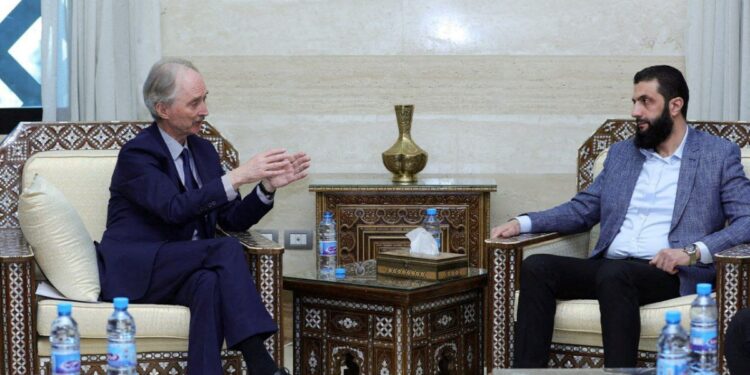12/17/2024–|Last updated: 12/17/202401:43 PM (Mecca time)
During his meeting with several foreign delegations, the Commander-in-Chief of the Syrian Administration, Ahmed Al-Sharaa, called on Western governments to lift the sanctions imposed on Syria and remove the terrorist designation of Hay’at Tahrir Al-Sham.
Al-Sharaa explained that these sanctions “were imposed on the executioner who has now departed,” and that lifting them was necessary to facilitate the return of Syrian refugees who fled due to the war, and to enable the rebuilding of the country.
The United Nations Special Envoy for Syria, Geir Pedersen, also called for an end to the sanctions imposed on Syria, while he was in Damascus recently on his first visit to the country after the fall of Bashar al-Assad’s regime.
After his meeting with Al-Sharaa, Pedersen stressed the need for state institutions to begin working fully while ensuring security. He also expressed his hope that the sanctions on Syria would end quickly and that the recovery process would begin soon.
On December 8, 11 days after a lightning attack, opposition fighters led by Hay’at Tahrir al-Sham announced control of Damascus.
The new Syrian administration is keen to persuade the world to lift the imposed sanctions, to enable parties wishing to invest in the country, which needs huge sums of money to reconstruct it and provide many needs that the population lacks.
Here is a look at the economic sanctions imposed on Syria:
Western sanctions imposed on Syria include a wide range of economic and political measures imposed by the United States, the European Union, and other Western countries since the beginning of the Syrian crisis in 2011. These sanctions aim to put pressure on the Syrian government to stop violence and violations against civilians, and to achieve a political transition in the country.
The penalties imposed include:
- Asset Freeze: Freeze the assets of the Syrian government and Syrian officials abroad.
- Prohibition of financial transactions: Preventing dealing with the Central Bank of Syria and Syrian financial institutions.
- Investment restrictions: Prohibition of investment in the oil, gas and energy sectors.
- Export ban: Preventing the export of technology and equipment that may be used in military action.
- Preventing the import of Syrian oil.
- Ban on the sale of oil equipment.
- The sanctions included including hundreds of Syrian figures and entities on sanctions lists, freezing the assets of these figures, and banning their travel.
- The sanctions included preventing Syrian aircraft from flying in the airspace of Western countries or landing at their airports. And banning the export of aircraft or spare parts to Syria.
- The sanctions also included restrictions on the export of technology and software that may be used in Internet censorship.
- The West warned of imposing sanctions on countries or companies that deal with the Syrian government or help it evade sanctions.
These sanctions had direct effects on the Syrian economy, as they caused a tightening of the Syrian economy, leading to a significant decline in vital sectors such as oil, agriculture, and industry.
The sanctions affected civilians as the humanitarian crisis worsened due to shortages of basic supplies and sharp rises in prices.
In general terms, Western sanctions succeeded in reducing the financial resources of the ousted Syrian regime and reducing its flexibility in conducting external commercial and monetary transactions. However, instead of changing its behavior, the previous government searched for new resources and channels and redistributed the resources available from the majority of Syrians in favor of its system.



